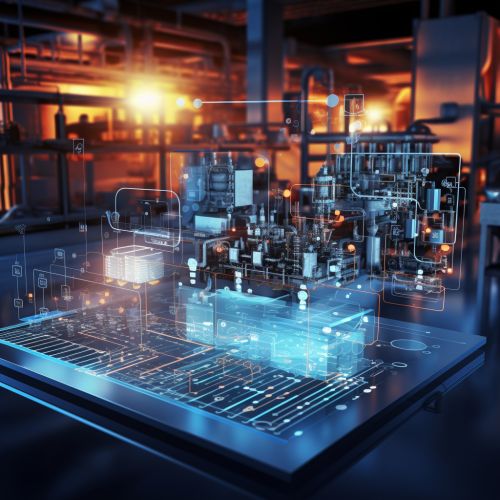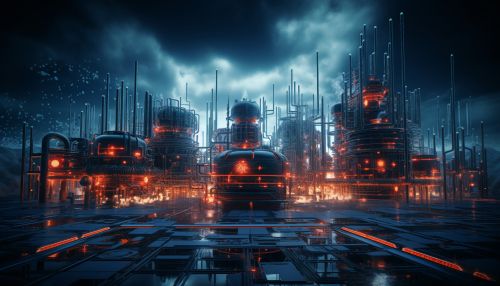Technological system
Overview
A technological system is a system that takes an input, changes it according to some rule, and then produces an output. It is a term much used in the discourse of systems theory, particularly in relation to the diffusion of innovations and technological change. Technological systems are not just about technology itself, but also about the social, political, and economic environments in which technology is designed, produced, and used.


Components of Technological Systems
Technological systems are comprised of seven major components: goals, inputs, processes, outputs, feedback, control, and environment. Each of these components plays a critical role in the functioning of the system.
Goals
The goals of a technological system are the desired outcomes or results. These goals guide the design and operation of the system. They can be as simple as producing a specific product or as complex as improving the quality of life for a community.
Inputs
Inputs are the resources that are put into the system to achieve its goals. These can include raw materials, energy, information, and human effort. The quality and availability of inputs can significantly affect the performance of the system.
Processes
Processes are the actions, steps, or operations that transform inputs into outputs. These can include manufacturing processes, communication processes, and decision-making processes. The efficiency and effectiveness of these processes are key determinants of the system's performance.
Outputs
Outputs are the products, services, or results produced by the system. They are the tangible manifestations of the system's goals. Outputs can be beneficial (desired results) or detrimental (waste or pollution).
Feedback
Feedback is information about the performance of the system that is used to adjust and improve its operation. Feedback can be internal (from within the system) or external (from the system's environment).
Control
Control is the means by which the operation of the system is regulated. Control mechanisms can include rules, laws, policies, and physical devices. Effective control is essential for the system to achieve its goals and respond to changes in its environment.
Environment
The environment is the context in which the system operates. It includes all the external factors that can affect the system, such as economic conditions, social trends, and natural phenomena.
Types of Technological Systems
Technological systems can be classified into several types, based on their purpose, complexity, and scale.
Production Systems
Production systems are designed to produce goods or services. They include manufacturing systems, construction systems, and service delivery systems. These systems often involve complex processes and require significant inputs of materials, energy, and labor.
Information Systems
Information systems are designed to collect, process, store, and distribute information. They include computer systems, telecommunications systems, and data management systems. These systems play a crucial role in modern society, enabling the flow of information that underpins economic activity, social interaction, and governance.
Infrastructure Systems
Infrastructure systems provide the basic facilities and services that support the functioning of society. They include transportation systems, utility systems, and public service systems. These systems are often large-scale and involve significant investments of resources.
Social Systems
Social systems use technology to facilitate social interaction and communication. They include social media platforms, online communities, and virtual reality systems. These systems have transformed the way people communicate and interact, with profound implications for society.
Technological System Life Cycle
Like all systems, technological systems go through a life cycle that includes stages of inception, growth, maturity, and decline.
Inception
The inception stage involves the identification of a need or opportunity, the formulation of goals, and the design of the system. This stage often involves significant creativity and innovation.
Growth
The growth stage involves the implementation of the system and the expansion of its capacity and reach. This stage often involves challenges of scaling up and managing complexity.
Maturity
The maturity stage involves the optimization of the system's performance and the maximization of its benefits. This stage often involves challenges of maintaining efficiency and effectiveness in the face of changing conditions.
Decline
The decline stage involves the obsolescence of the system and its replacement by new systems. This stage often involves challenges of managing transition and mitigating negative impacts.
Impact of Technological Systems
Technological systems have a profound impact on society, shaping the way we live, work, and interact. They can bring significant benefits, such as increased productivity, improved quality of life, and enhanced communication. However, they can also pose challenges, such as resource depletion, environmental pollution, and social disruption.
Positive Impacts
Technological systems can increase productivity by automating tasks, improving processes, and enabling new capabilities. They can improve quality of life by providing goods and services that meet human needs and desires. They can enhance communication by facilitating the exchange of information and ideas.
Negative Impacts
Technological systems can deplete resources by consuming large amounts of materials and energy. They can pollute the environment by producing waste and emissions. They can disrupt society by changing patterns of work and interaction, creating inequalities, and undermining traditional values and practices.
Future of Technological Systems
The future of technological systems is likely to be shaped by several key trends, including the increasing integration of systems, the growing importance of information and communication technologies, and the rising concern for sustainability.
Integration of Systems
Technological systems are becoming increasingly integrated, with different systems interacting and influencing each other in complex ways. This integration can lead to greater efficiency and effectiveness, but it can also create vulnerabilities and challenges of coordination and control.
Importance of Information and Communication Technologies
Information and communication technologies are playing a growing role in technological systems, enabling the collection, processing, and distribution of vast amounts of data. This trend is driving advances in areas such as artificial intelligence, big data analytics, and the Internet of Things.
Concern for Sustainability
There is a growing concern for the sustainability of technological systems, with a focus on reducing resource consumption, minimizing environmental impact, and promoting social equity. This concern is driving efforts to develop more sustainable technologies and systems, such as renewable energy systems, circular economy models, and inclusive technologies.
